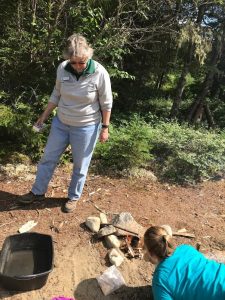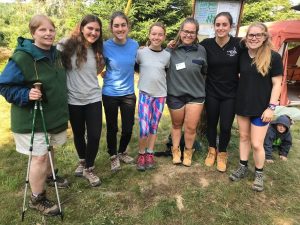The Junior Maine Guide (JMG) program has been a mainstay at Camp Runoia for decades. It provides older campers with the opportunity to participate in a Maine State, organized youth program that develops and tests their wilderness skills. It is a rigorous program that can take a couple of years to accomplish. Camp develops all kinds of life skills and becoming a JMG is a huge achievement but the process also has great value.
This weeks guest blog is Lilly Grace’s college application essay that focused on her time working towards becoming a JMG.
Common App Main Essay by Lilly Grace
To the average person, building a roaring fire with a soaking wet billet of wood, an axe and just a few matches may seem like a nearly impossible task. After all, that’s what I thought as I was first learning how to make a “wet day fire.” However, what most people don’t realize is that the dryness of a billet is irrelevant to one’s ability to build a “wet day fire.” Rather, what is most critical to their success is practice, preparation, and an ability to persevere through
setbacks until ultimately satisfied. Building a wet day fire is a mentally and physically challenging skill that is just one of twenty-one tests to become a Junior Maine Guide. Although the process of becoming a Junior Maine Guide was only intended to teach me wilderness skills, I believe it was the most rewarding experience of my life thus far because I gained more than just a vast amount of knowledge about the wilderness. I also took this unique opportunity to
learn and develop critical life skills.

One thing that I learned quickly upon arrival at the five day testing encampment is that candidates must be organized, disciplined, and confident in order to succeed in this environment where there is little structure. I had three full days to complete twenty-one tests at any time and in no specific order. I lacked those three essential qualities that I needed, and JMG presented additional challenges that I had never had to tackle before in school. However, as I had learned from my past experiences, success is something that does not come easily to me and has always required more time, effort and motivation on my part. Therefore, these challenges that I was presented with were simply just a few hurdles in reaching my goal.Throughout the three summers, I was committed to gaining the skills needed to succeed.
I overcame my organizational challenges by making study and testing schedules that were essential to keeping myself motivated and on track throughout the summer, and I made sure to stick to them. I learned how to study in more exciting and efficient ways that developed my self-discipline. For example, when learning locations on the map of Maine, my friends and I would place M&Ms on the different locations and if we guessed the location correct, we were
rewarded with the candy. As for my time-management, I learned that using a watch was extremely beneficial to budgeting my time and ensuring that I was able to complete every test in the short time frame. And once I learned that I could build a Wet Day Fire and solo a canoe with ease, I knew I had the confidence to take on anything.
Becoming a Junior Maine Guide has been, by far, the proudest moment of my life, as I knew it was something that I worked so hard to accomplish on my own. This rigorous program typically takes two years to complete, however it took me three. While some people may perceive my additional year in the program as a failure, I choose to see it as a blessing in disguise. I struggle with ADHD and weak executive functioning skills, which is something that affects my everyday life, but I clearly have never let it stop me. In fact, I believe that I have made more improvement with my executive functioning skills through trial and error in the JMG program than I ever have in a school classroom. In the end, I proved to myself and others that I am exceedingly capable of persevering through my learning challenges to accomplish anything that is important to me. It just might take some additional time and effort.
